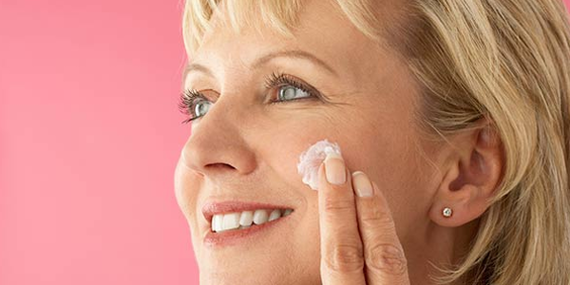"I want to look older."
Said no one ever (no one over 20, that is).
Six weeks after my daughter was born, I saw them. Lines! Crow's feet! When did that happen? Of course, I'm proud of the life experiences that brought these lines. But that doesn't mean I won't put up a leeeetle bit of a fight to prevent them. Fortunately, we have many options now - from minimal to more involved treatments. Unfortunately, there is also a lot of hype and false claims around skin care products and anti-aging treatments. So, to tell us what really works, I asked two of my favorite dermatologists -- Amy Kim, MD, dermatologist at MetroDerm in Atlanta and founder of Baby Pibu Products, and Brian Raphael, MD, dermatologist and fellow at Skincare Physicians in Chestnut Hill, Massachusetts.
Consider this your à la carte menu for getting skin that's smoother than a baby's you-know-what.
What to do at home
1. Sunscreen: This one's a no-brainer. Daily use prevents wrinkles and age spots in the first place. News flash: most of us aren't using it correctly. You need to use a nickel-sized amount for your face and reapply every one to two hours to get nonstop protection. Make sure to use SPF 30 and above, broad spectrum. Don't want to mess up your makeup? Use a mineral powder with SPF for touchups (I keep this in my purse, and writing this just reminded me to reapply - so thank you!).
2. Retinoids: Every dermatologist I know swears by retinoids -- a vitamin A derivative that comes in cream or gel form. Retinoids work their magic by preventing collagen breakdown and stimulating skin cell turnover, giving you what Dr. Kim calls the "Retinoid Glow." They also prevent and treat acne (No one warned me that you could get both acne and wrinkles in adulthood. Whose idea was that?). Opt for the prescription form (often called tretinoin or Retin-A), as they are much more effective than over-the-counter forms. Most insurance companies won't cover retinoids and -- warning - they can be expensive. But one tube will last you at least two to three months and is a better investment than most expensive over-the-counter creams. Expect your skin to peel at first, and only use a small amount as directed. Those with sensitive skin may find that they can only tolerate it every other night.
3. Don't Over-Spend on Basic Moisturizers: Moisturizers are great for hydration, and are important as our skin ages. However, most of the claims for expensive/"high tech" moisturizers don't provide significant benefit over those from reputable drugstore brands and probably don't merit the additional splurge.
What to Consider at the Dermatologist
If you want to go a step further to brighten dull skin, reduce wrinkles and fade brown spots, here are the most effective options. Note: You do not have to do all of these to get positive results (in fact, please don't - look no further than certain celebrities to know that more is often less when it comes to cosmetic procedures).
4. Chemical Peels: To really reduce lines and improve the tone and texture of your skin, derms recommend getting a "medium depth peel" two to three times a year. The downside: You'll look (and feel) like you have a really bad sunburn for three to five days, so be sure not to schedule this before any important events. It's smart to get a chemical peel in the winter, since you have to avoid all sun exposure for a few days after treatment.
5. Laser Treatments: These treatments are newer and can be pretty expensive, but they do smooth the surface of the skin and reduce the appearance of wrinkles and lines. There are a variety of laser treatments, some which have a similar effect to peels, and others with greater intensity for older skin. Your dermatologist will be able to recommend which is better for your skin.
6. Botox: Dr. Raphael noted that Botox injections are helpful for not simply treating wrinkles, but preventing them in the first place. Botox is best for between the eyebrows, around the eyes and forehead and will need repeat injections every three to six months to maintain its effect. Botox placement can truly change your appearance (ever seen the permanently "shocked" people?) so if you do go this route, please avoid the "Discount Botox" places, and instead go to a board-certified dermatologist or plastic surgeon's clinic.
7. Fillers: These are effective for rejuvenating the lower portion of the face, says Dr. Raphael, especially around the nose and mouth, and under eye area. Depending on the type of fillers, they can last anywhere from six months to two to three years.
While these cosmetic fixes can improve your look from the outside, don't forget the impact that a healthy body has on your skin. Even in the ER, I can often tell someone's health status from their skin -- it reveals their nutrition and exercise habits, whether they smoke, have heart disease, get enough sleep and have good social support. Especially the last one - because having beauty doesn't guarantee you'll be happy and loved, but being happy and loving certainly ensures that you'll be beautiful.
This content originally appeared on Sharecare.com.
Listen to Dr. Darria interview Dr Kim on Sharecare Radio here.
Check out more articles by Dr. Darria Long Gillespie:
